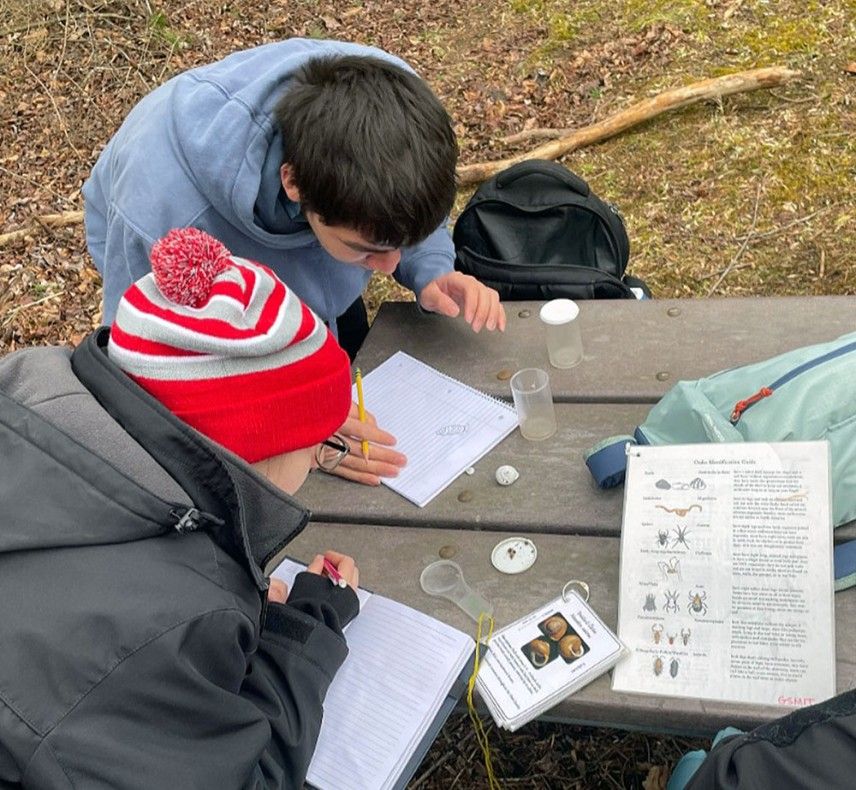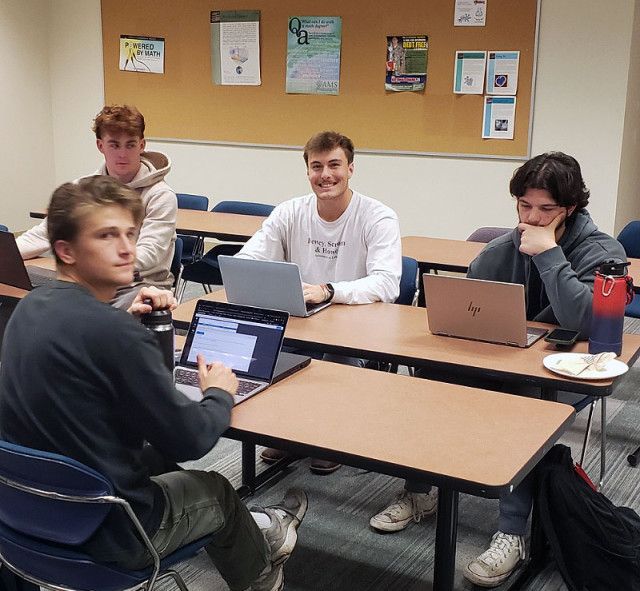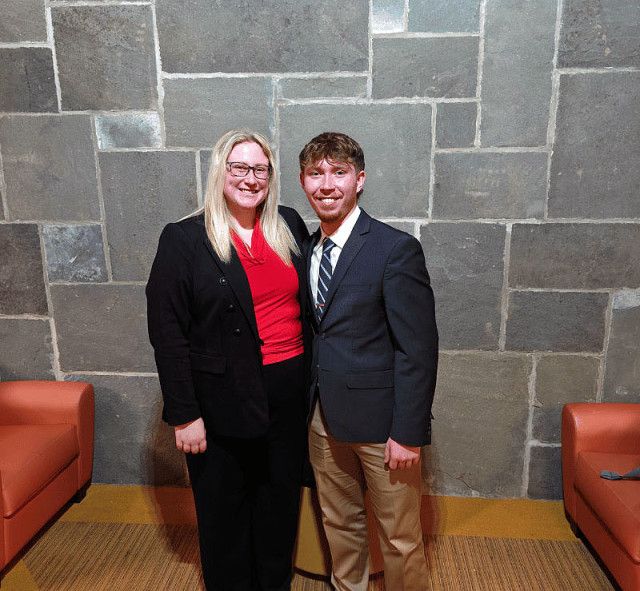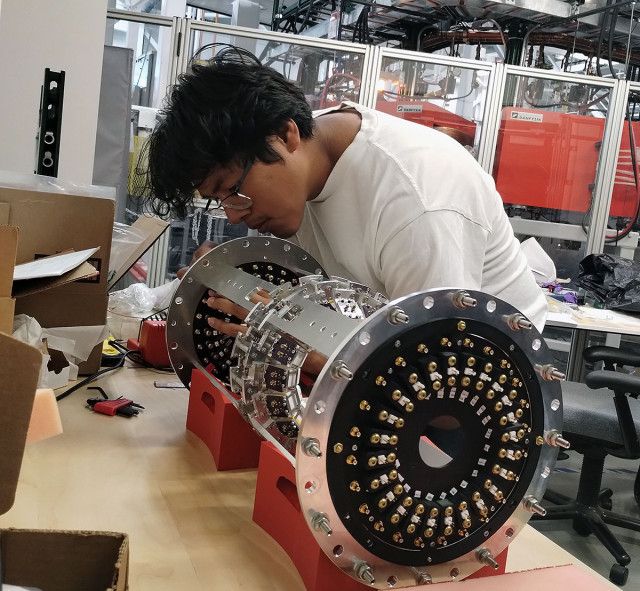Combining nature with teaching is something that Charity Perry, class of 2025, experienced firsthand through her recent FIRE Week experience at the Great Smoky Mountains Institute at Tremont (GSMIT) near Gatlinburg, Tennessee.
Perry, a biology major pursuing a minor in education from Garfield Heights, Ohio, is one of three recipients of the U.S. National Science Foundation’s Robert Noyce Teacher Scholarship Program.
“The experience I had at GSMIT met my initial expectations of what the trip would be like. I was thrilled when I had the opportunity to conduct investigations, connect with nature, and improve my teaching of science by using nature,” said Perry, who plans to teach AYA 7-12 Life Science and be a K-12 intervention specialist. “I enjoyed the times we sat at our sit spots every morning after breakfast. I am often caught up in general life that I forget how much I enjoy sitting near the creek waters. It was nice to live in the moment rather than thinking about all the future ones, even if it was just 30 minutes a day.”
During the week participants were able to connect with Tremont faculty and learn how teachers from across the country implement experiential learning opportunities, while adding outdoor mindfulness and exposure therapy techniques in the classroom. Through experiencing the inquiry-cycle firsthand, the 22 trip participants learned how teachers can stimulate curiosity and creativity in their K-12 students, all against the stunning biodiversity of the Great Smoky Mountains National Park.
“As a teacher, I have always valued the opportunities to immerse students in nature,” Perry said. “However, at GSMIT, I finally learned how I can make it a reality. I now have ideas I can relate to so I can provide my students with an authentic experience outdoors. This trip did not only change my perspective but enhanced my love and passion for science education.”
Perry, who served as a peer mentor, a library circulation worker, and a Parkhurst Dining employee, as well as a member of Alpha Phi Omega at Wittenberg, now encourages other students to take advantage of the GSMIT FIRE Week program.
“Having opportunities to learn about our world in this unique way shouldn't be passed up,” she said. “It will take you back to a time where you can unwind, be curious, and be a kid again. If I wasn't a graduating senior, I would love to attend this trip again. Every year provides a different experience and different perspectives to gain knowledge on outdoor science education. Even if you are not a science or education major/minor, anyone could benefit from this experience. In each session/event offered, there are real-life skills that can be learned (hiking tips, identification, medicinal properties, etc.). This is also a great experience if you wish to disconnect from the mainstream world for a few days. As for future involvement with GSMIT, it is a great organization to work with, and I would enjoy future involvements with them or similar programs.”
Opportunities with GSMIT are growing with the launch of a new course at Wittenberg. To be taught by a GSMIT faculty member and focused on two practicing teacher activities – the Schoolyard Network and Teacher Escape Weekend – the course is already gaining interest with 11 students signed up for Fall 2025 semester. The Schoolyard Network is a professional learning community (PLC) that meets monthly to support teachers in methods to give students meaningful outdoor instruction. Teacher Escape Weekend is an opportunity for teachers to travel to GSMIT and take part in a weekend of professional development.
Led by Mike Daiga, associate professor of mathematics education, and Adam Parker, professor of mathematics, the National Science Foundation’s Robert Noyce Teacher Scholarship Program awarded Wittenberg a $1.2 million continuing grant for the ASCENT-STEM (Addressing Springfield Community’s STEM Education Needs Together) initiative. The grant is an example of the out-of-the-box thinking that aligns with the Robert Noyce Teacher Scholarship Program. Other recipients of the scholarship include McKenna Clark ‘26 and Savannah LaMar ‘26, who are also pursuing degrees as secondary STEM teachers. The effort includes partnerships with the Springfield City School District, the Global Impact STEM Academy, and Clark State College.
Students who are interested in learning more about Wittenberg’s Robert Noyce Scholarship Program or who wish to become a Noyce Scholar, should visit this website.
About the Robert Noyce Teacher Scholarship Program
According to its website, the National Science Foundation’s Robert Noyce Teacher Scholarship Program provides funding to institutions of higher education to provide scholarships, stipends, and programmatic support to recruit and prepare STEM majors and professionals to become K-12 teachers. The program seeks to increase the number of K-12 teachers with strong STEM content knowledge who teach in high-need school districts. NSF encourages partnerships between four-year institutions and two-year institutions, providing pathways leading to STEM teacher certification.
Wittenberg’s ASCENT-STEM program is supported by the Robert Noyce Teacher Scholarship Program Grant No. 2344921. Any opinions, findings, and conclusions or recommendations expressed in this project are those of the author and do not necessarily represent the views of the National Science Foundation.







